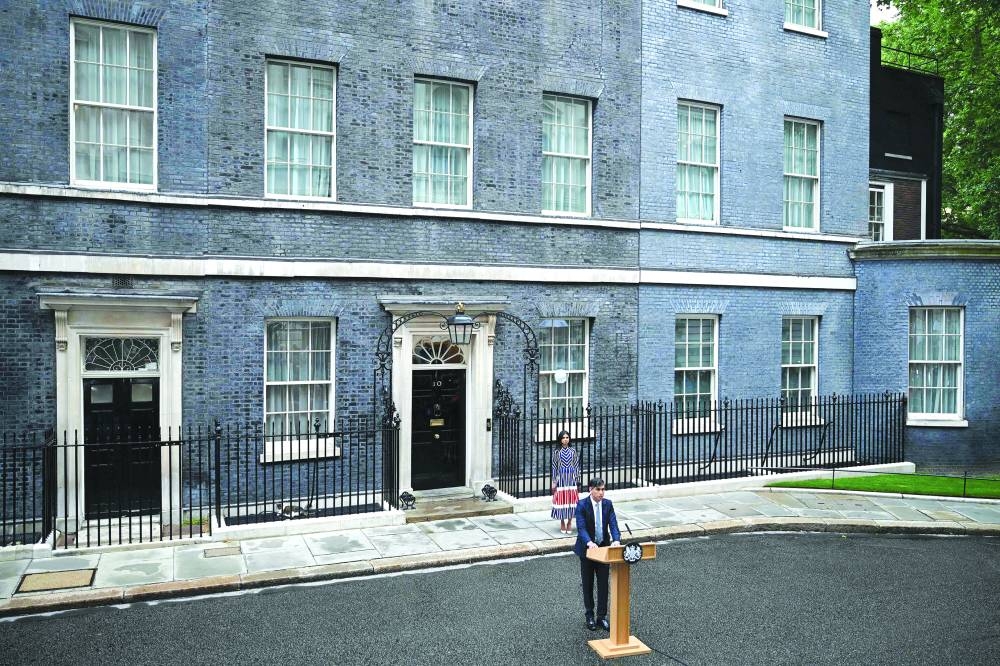Britain’s Conservative Party, thrashed by Labour at the general election, faced yesterday the task of rebuilding as leading right wingers warned it could face extinction unless it starts listening to its core voters.
A record number of ex-prime minister Rishi Sunak’s top team and other prominent Tories lost their seats in Thursday’s electoral drubbing.
The anti-immigration Reform UK party led by Brexit firebrand Nigel Farage maximised the damage by splitting the right-wing vote and picking up former Tory supporters in key constituencies.
Even before campaigning had ended, one former minister had launched am excoriating attack on the party for not grasping that “our failure to unite the right would destroy us”.
Former interior minister Suella Braverman, seen as a leadership contender, correctly predicted the Tories would haemorrhage votes to Reform.
“Why? Because we failed to cut immigration or tax or deal with the net-zero and woke policies we have presided over for 14 years,” she wrote in the Daily Telegraph.
Conceding inevitable defeat, she called for a “searingly honest post-match analysis”, adding that it would “decide whether our party continues to exist at all”.
Major British political parties have seen dramatic downturns in their fortunes before.
In the years after World War I, a divided Liberal Party found itself supplanted by the Labour Party as the main opposition.
The party of 19th century political giant William Gladstone and World War I leader David Lloyd George never again regained its earlier status as a party of government.
Other senior party voices to deliver an early diagnosis of the Conservatives’ current predicament included David Frost, chief Brexit negotiator under former prime minister Boris Johnson.
Frost resigned from government in December 2021, citing Johnson’s tax hikes and net zero commitments among other complaints.
To revive traditional Conservative values and electability “after the cataclysm”, he called for the creation of a “new movement for “reformed conservatism”.
Sunak has said he will stay on as party leader until arrangements are put in place to choose a successor amid fears the party will now descend into bitter infighting.
Potential leadership candidates who managed to hang on to their seats include former home secretaries Braverman and Priti Patel, and ex-finance minister Jeremy Hunt.
“There’s going to be a very immediate issue around how to relate to Nigel Farage,” Michael Kenny, director of the Bennett Institute for Public Policy at the University of Cambridge, told AFP.
He said there would be a push to find a leadership candidate who could unite the party but “not provide an opening to Farage”.
Others may look for someone potentially “more open to the idea of fusing with Reform”.
Kenny said what had been unusual about this election was the way the “battle for the soul of the party” had been started before a single vote was cast.
With the Conservatives scoring a record low of just 121 seats, handing Starmer’s government a majority in parliament of more than 170, some have predicted Labour could be in power for a generation.
However, Philip Cowley, professor of politics at Queen Mary University of London, cautioned against too much pessimism.
He said that people had been “writing off” one or more of the main parties ever since the early 1960s, when it was claimed demographics meant Labour could never win again “only for them to do so in 1964”.
In 1992, after the Conservatives won their fourth consecutive victory, there were again “lots of talk about how Britain was now a one-party state, only for Labour to go on to win their greatest ever landslide five years later”, Cowley added.
More recently, he noted, commentators suggested the Conservatives could never win again during the tenures of former Labour leaders Tony Blair and Gordon Brown.
“And yet they did,” in 2010 with David Cameron.
London School of Economics political expert Tony Travers said the Conservative Party was the “world’s most durable political party” in many ways but that the result was still a “disaster”.
While “not a massive amount of difference” stood between Labour and the Conservatives on many policies, Labour had managed to look more centrist and moderate to the electorate, he added.
And divisions that had beset the party could prove a major obstacle to reinventing itself, Travers said. “They were split after Brexit ... there’s a civil war going on all the time, which is going to make their life difficult in the coming parliament.”
Offering his own analysis in the Daily Mail yesterday, Tory ex-prime minister Boris Johnson highlighted that Labour’s landslide majority was built on fewer votes than it secured in 2019 when the Conservatives under Johnson won an 80-seat majority.
“We are capable of endless regeneration,” he said.

This picture taken on Friday shows Rishi Sunak, watched by his wife Akshata Murty, delivering a statement after his general election defeat, outside 10 Downing Street in London. – AFP
